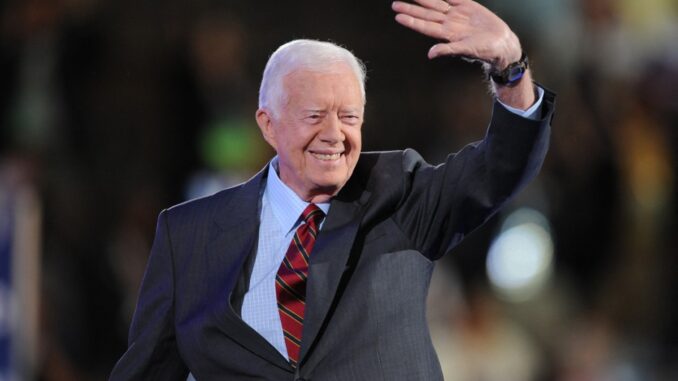
In describing James Earl Carter, popularly called Jimmy Carter, adjectives and superlatives are simply exhausted and squandered.
Jimmy Carter who died on Sunday, December 29, 2024 at the age of 100 years was America’s longest lived President. He was perhaps the most prolific former American President. He was a diplomat extraordinary and plenipotentiary. He was probably the most chaste, moral and humblest former President. He was the most spartan. He was Africa’s best friend. His Camp David Accords were the most enduring in the storied annals of the Middle East.
In the aftermath of his crushing defeat in the 1980 election by Ronald Reagan, President Jimmy Carter set up the Carter Centre in 1982. Under its auspices, he promoted and expanded the frontiers of human rights. For his muscular exertions, he received the Nobel Peace Prize in 2002.
Carter traversed the globe, conducting peace negotiations and setting free hostages held by dictatorial regimes.
Under the canopy of the Carter Centre, he monitored many elections across the world. The observation reports of the Carter Centre were noted for their credibility and thoroughness. Where elections went well and accorded with international best practices, the Centre was often forthcoming with its praise. Where they came short, its monitors were forthright and scathing. Soon, the Centre’s monitoring and reporting became the gold standard. The Centre also endeared itself to world-class statesmen and women who made their services available.
The late Carter was a formidable presence in the non-profit housing organisation, Habitat For Humanity. Under its umbrella, affordable houses were built for the poor and needy. Most importantly, his being a spearhead of this noble organisation brought to the fore the need to address housing for the less privileged on a global scale.
Spurred by a determination to alleviate suffering and to improve the quality of life for the poor in not less than eighty countries, the Carter Centre worked assiduously to eradicate Guinea worm disease. He did so in collaboration with the World Health Organisation (WHO). Nigeria and several African countries were beneficiaries of the Centre’s campaign.
Apart from working hard, and in concert with kindred spirits across the world to ameliorate the human condition, Carter remained cerebral to the end. He authored books. These books ranged from political memoirs to poetry. According to one account, “on average, he completed just about one book per year over these 35 years, including bestsellers, a novel and a children’s book”.
This writer stands to be corrected, but Carter must rank as probably the humblest of American Presidents and Africa’s truest friend. When he visited Nigeria from March 31st to 3rd April 1978, one of his landmark events was an address which he delivered at the Nigeria Institute of International Affairs (NIIA), Lagos.
That speech, rendered extemporaneously, was imbued with cadence and invested with incontrovertible figures. His facility with figures, and his sense of detail while delivering off the cuff speeches, was noted by several elites, including the world’s first television anchor, Walter Cronkite, in his memoirs, A Reporter’s Life.
That luminous speech was prefaced by an unforgettable declaration by Carter:”I come from a great country to a great country”. In stating this, Carter was neither condescending nor was he hypocritical. His credentials, forged in the civil rights movement and his singular aversion for racial segregation, bear him out. Besides, in hindsight, this was Nigeria’s finest hour. It was a moment when the Naira was stronger than the American Dollar. It was a time when our industries hummed and our automotive assembly plants rolled out cars, trucks and tractors.
It is a testimony to Carter’s love for Africa that he befriended and collaborated with several of its statesmen such as Olusegun Obasanjo, Kenneth Kaunda, Desmond Tutu, Nelson Mandela etc.
Yet, and until after his one-term presidency, Carter’s tenure was thought to be lackluster and mediocre. In fact, American historians had ranked Carter’s presidency as below average.
In spite of this disparaging assessment, all thanks to the energy and hostage crises spawn by the Iranian Revolution of the late 1970s, Carter vowed that history would be kind to him. He rolled up his sleeves and went to work with a single-minded determination. Lo and behold, and decades after, Carter has burnished and made over a reputation once torn into shreds and viewed with disdain. Now his post-presidency activities have been universally praised by friends and foes alike.
This must be the ultimate and authentic comeback. It should commend itself to all humanists. It should also inspire persons who were hitherto dismissed as failures.
Dazang wrote from Abuja.
Guardian (NG)
END

Be the first to comment